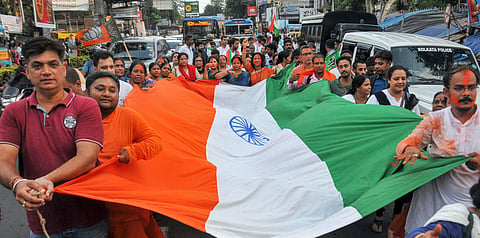Article 370 abrogation: It’s Patel 2.0
NEW DELHI: Turning the Jammu & Kashmir narrative on its head, the Narendra Modi government on Monday took away the special status accorded to the state, which, it said, was the root cause of all ills including terrorism. Rescinding the provisions of Article 370 will also mark the end of J&K’s seven decades of detachment from the rest of the country.
With the Lok Sabha also set to pass the resolution on Tuesday night, all Central laws will come in force in Jammu and Kashmir as well. After days of speculation triggered by the unprecedented security mobilisation in the state, the Union Cabinet met on Monday morning at 7, Lok Kalyan Marg — the residence of the Prime Minister — to approve a parliamentary resolution to adopt a Presidential order on Article 370. It was also decided to move a state reorganisation bill to carve two Union territories out of J&K — Jammu and Kashmir with an Assembly and Ladakh without a legislature.
The Cabinet meeting was preceded by two key meetings. First, Union Minister for Law and Justice Ravi Shankar Prasad briefed Home Minister Amit Shah on the legal aspects of the decisions. Thereafter, Shah went into a huddle with Prime Minister Narendra Modi for about an hour to give final shape to the plan.
With the script in place, Union ministers Rajnath Singh, S Jaishankar and Nirmala Sitharaman were called for a brief meeting of the Cabinet Committee on Security.
Parliamentary action then began in the Rajya Sabha with Shah spelling out the finer points of the big legislative move, which invited instant emotional outbursts from leader of the Opposition Ghulam Nabi Azad. After realisation dawned on what it was all about, non-NDA parties decided to take part in a short duration discussion, with the likes of the BSP, TDP, YSR Congress, BJD, and AAP supporting the move.
BJP MP Swapan Dasgupta, sources said, was instructed to seek clarifications from Shah on the Constitutional validity and longevity of the Union Territory status for J&K.Shah, in his reply, clarified: “There’s absolutely no question on the Constitutional validity of the resolution abrogating Article 370. The government will consider restoring the statehood to J&K, but that would be incumbent upon total purge of militancy.”
Former home minister and senior Congress leader P Chidambaram made a forceful intervention during the discussion, calling the government actions a “monumental blunder”.“Don’t commit the cardinal sin of dismembering the state. You have made a legal error and you will discover that in due time,” Chidambaram said.
Shah singled out Chidambaram in his combative defence of the big moves, while squarely blaming Article 370 for all the problems of J&K — militancy, corruption, unemployment and political monopoly.
“Right to education is not applicable in J&K. Hospital infrastructure couldn’t come up due to Article 370. Despite much higher per capita fund flow in the state, there is no development in the state,” the home minister pointed out.
Explaining why it makes sense to do away with Article 370, Shah said, “Because of Article 370, democracy has never percolated in Jammu and Kashmir, corruption grew to its peak and poverty increased in the area. There are people of different religions in the Valley and we are not politicising on the basis of religion. The people of Jammu and Kashmir want democracy and if you see clearly, you will know how much Article 370 has harmed J&K.”
Shah highlighted that political reservation for OBCs and Dalits could not be implemented in J&K because of its special status. Also, no hospitals could be set up there owing to the rule prohibiting purchase of land by outsiders. That was also the reason why no industry could be set up, leading to unemployment, he explained.
“What have Articles 370 and 35(A) given other than death and destruction?” he asked.
He mocked that those who are saying there will be bloodshed in Kashmir have sent their children to London and other countries to study.
“I want to assure them when the situation gets normal and the right time comes, we are ready to make Jammu and Kashmir a state again. It may take a little longer, but it will become a state once again, one day,” he added.
Later, the Rajya Sabha adopted the reorganisation bill with 125 ayes and 61 noes, with the Congress, DMK, TMC and Left opposing, and JD(U) staging a walkout.

